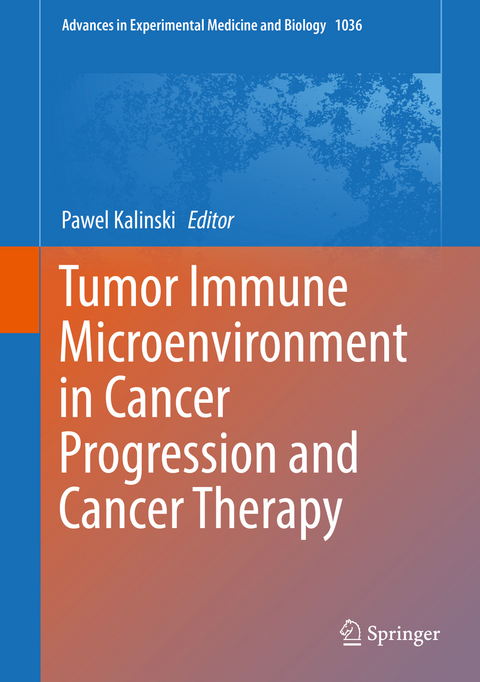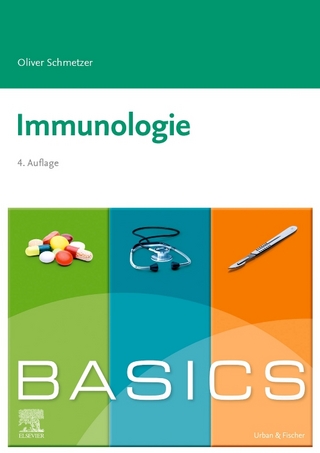
Tumor Immune Microenvironment in Cancer Progression and Cancer Therapy
Springer International Publishing (Verlag)
978-3-319-67575-6 (ISBN)
Pawel Kalinski, M.D., Ph.D., is the Vice Chair for Translational Research and Professor of Oncology in the Department of Medicine at Roswell Park Cancer Institute (RPCI) in Buffalo, NY. He is also the Director of Cancer Vaccine and Dendritic Cell Therapies in the Center for Immunotherapy, and a Co-Leader of the Tumor Immunology & Immunotherapy Program of RPCI. Dr. Kalinski is a member of the Society for Immunotherapy of Cancer (SITC), American Association of Immunologists (AAI), American Association for Cancer Research (AACR) and the American Society of Clinical Investigation (ASCI) and an editorial board member of several journals in the area of cancer immunology and immunotherapy. He has been the recipient of multiple grants from the National Cancer Institute in recent years. Dr. Kalinski has published over 130 papers in the areas of immunology and cancer research and has been cited over 5,500 times.
Part 1. Interplay Between Tumor Cells, Stroma and Inflammatory Infiltrate in Regulating Tumor Micro-Environment.- Tumor Immuno-Environment in Cancer Progression and Therapy.- Cancer Immunotherapy Targets Based on Understanding the T Cell-Inflamed Versus Non-T Cell-Inflamed Tumor Microenvironment.- Regulation of CTL Infiltration Within the Tumor Microenvironment.- The Role of Tumor Microenvironment in Cancer Immunotherapy.- Part 2. Mediators of Tumor Microenvironment.- Immunogenic and Non-Immunogenic Cell Death in the Tumor Microenvironment.- Exosomes in Cancer: Another Mechanism of Tumor-Induced Immune Suppression.- Chemo-immunotherapy: Impact of Indoleamine 2,3-dioxygenase in Defining Immunogenic versus Tolerogenic Cell Death in the Tumor Microenvironment.- Targeting Myeloid-Derived Suppressor Cells in Cancer.- Tryptophan catabolism and cancer immunotherapy targeting IDO mediated immune Suppression.- Part 3. Emerging Targets and Technologies of Modulation of Tumor Microenvironment.- Tumor Microenvironment in Cancer Progression and Therapy.- The Role of the Immune System and Immunoregulatory Mechanisms Relevant to Melanoma.- Oncolytic Virotherapy and the Tumor Microenvironment.- The Impact of Housing Temperature Induced Chronic Stress on Preclinical Mouse Tumor Models and Therapeutic Responses: An Important Role for the Nervous Role for the Nervous System.- (Immuno)therapeutic Targeting of Tumor-Associated Blood Vessels.- Adaptive Resistance to Cancer Immunotherapy.- Imaging the Tumor Microenvironment.
| Erscheinungsdatum | 22.01.2018 |
|---|---|
| Reihe/Serie | Advances in Experimental Medicine and Biology |
| Zusatzinfo | XIV, 264 p. 47 illus., 43 illus. in color. |
| Verlagsort | Cham |
| Sprache | englisch |
| Maße | 178 x 254 mm |
| Gewicht | 673 g |
| Themenwelt | Medizin / Pharmazie ► Medizinische Fachgebiete ► Onkologie |
| Studium ► Querschnittsbereiche ► Infektiologie / Immunologie | |
| Schlagworte | Biomedical and Life Sciences • Cancer Research • cell death • Chemokines • Hypoxia • immunology • Medical Research • Metastasis • microenvironment • Molecular Biology • Molecular Medicine • Oncology • tumor stroma |
| ISBN-10 | 3-319-67575-3 / 3319675753 |
| ISBN-13 | 978-3-319-67575-6 / 9783319675756 |
| Zustand | Neuware |
| Haben Sie eine Frage zum Produkt? |
aus dem Bereich


